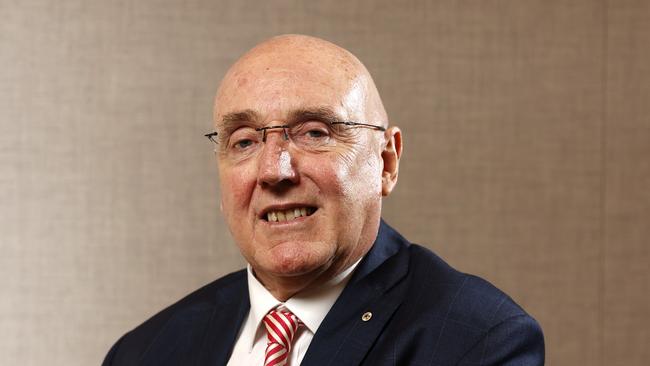Jobs and Skills Commissioner Barney Glover to join key Accord advisory committee
Higher education has a new power player, Jobs and Skills Commissioner Barney Glover, who is pulling many of the strings in university reform.

The federal government’s newly-minted Jobs and Skills Commissioner Barney Glover is expected to given a powerful new university role only months after he stepped down as vice-chancellor of Western Sydney University.
Education Minister Jason Clare is understood to be appointing him to the influential group that will advise the government on implementing the Universities Accord review, which will bring sweeping changes to the university sector.
The announcement is likely to be made in Tuesday federal budget.
The new role will give Professor Glover a uniquely powerful influence over higher education reform. He sat on the expert panel chaired by Mary O’Kane which undertook the Accord review and now he will shape the resulting reforms as a member of the implementation advisory committee.
In his role as Jobs and Skills Commissioner Professor Glover will also have a major influence on the whole of tertiary education because his organisation, Jobs and Skills Australia, will provide advice on what skills are needed in the economy and what training is required to provide them.
Professor Glover has long worked closely with Mr Clare whose electorate of Blaxland in western Sydney makes him one of Western Sydney University’s local MPs.
A key recommendation of the Universities Accord review was to establish a powerful new entity, the Australian Tertiary Education Commission, to oversee universities and Professor Glover, in a speech last week, said the higher education sector should not fear the new body.
He told the ATN25 national symposium on curriculum innovation on Friday that ATEC, should it be established, was not about intervention and direction.
He said he knew “many people fear that the autonomy of Australia’s universities will be at risk by virtue of having a tertiary education commission” but they should not be concerned.
“It’s very much about stewardship and it’s very much about consultation and mission-based agreements with individual institutions to recognise the context of institutions rather than, as many people fear, intervention,” Professor Glover said.
It is expected that ATEC, to be set up as a statutory authority, will be the government’s main source of policy advice on higher education, and will also allocate funding to teaching and research, decide the level of HECS-HELP fees and play a key role in involving First Nations people in higher education.
It is set to absorb the Tertiary Education Quality and Standards Agency, which regulates higher education, and the Australian Research Council, which distributes research funding.
Professor Glover said he was sure that the implementation committee would (if the commission was established) take into account sensitivities about the new body.
He said he would not see the Australian version of the commission as following the New Zealand model. “New Zealand’s TEC (tertiary education commission) is pretty interventionist and certainly I wouldn’t use that as a model,” he said. “It may be fit for purpose in New Zealand and I don’t criticise the role they play, but I know universities there do feel it’s interventionist.”
Professor Glover, who was speaking to the symposium in his role as Jobs and Skills Commissioner, said there was a “great deal of alignment” between the work of his new body, the JSA, and the Universities Accord review’s recommendations.
One of the recommended roles for ATEC is to align tertiary education with Australia’s skill needs. Professor Glover said that data and analysis from JSA would be “very, very valuable information” for ATEC’s consultation with the tertiary sector.
He said the JSA would play “a particularly important role” in developing a “joined up” system of tertiary education in Australia which had strong links between higher education and vocational education.
“We’re going to put some detail around what a joined-up system might look like, but it comes back to tertiary harmonisation,” Professor Glover said.
He said integration and partnership between the two sectors would be key.
“It comes back to the way we measure and describe pathways through and from education into the workforce, the lifelong learning components and, of course, upskilling and reskilling,” he told the university representatives at the symposium. “Keep an eye on the national skills system and the role you play in it.”








To join the conversation, please log in. Don't have an account? Register
Join the conversation, you are commenting as Logout